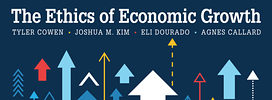I accept Eli Dourado’s point that economic growth will figure in the “next phase” of human history; perhaps he is also right that accelerating it accelerates the emergence of that stage, though that seems less obvious to me. But it is remarkable that the attempt to praise economic growth ends in demoting it.
If we think about the set of individuals who have contributed most to economic growth—Socrates, Vermeer, Newton—they do not correlate very well with interest in or commitment to economic growth. What does the aestheticizing of economic growth get us? Perhaps not economic growth.
More generally, I wonder if the paradox of what Bernard Williams called “Government House Utilitarianism” might apply to the ethics of economic growth (which is really just a branch of utilitarianism). The problem emerges from the fact that non-utilitarian (e.g. religion, or Kantian morality) motivations seem to produce more utility.
From Wikipedia:
some utilitarians have put forward a “radical proposal”; although they accept utilitarianism as the correct moral theory, it would be more beneficial if we do not proclaim this fact, and keep it a well-guarded secret. “Utilitarianism would then become an esoteric doctrine, accepted by only a few philosophers who would, if challenged, deny its existence in public.”

